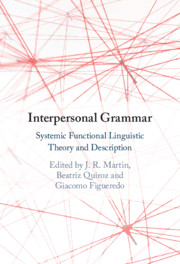Book contents
- Interpersonal Grammar
- Interpersonal Grammar
- Copyright page
- Contents
- Figures
- Tables
- Contributors
- 1 Introduction: Theory and Description in Interpersonal Grammar across Languages
- 2 Interpersonal Grammar in Spanish
- 3 Interpersonal Grammar in Khorchin Mongolian
- 4 Interpersonal Grammar in Mandarin
- 5 Interpersonal Grammar in Tagalog: Assessment Systems
- 6 Interpersonal Grammar of Pitjantjatjara
- 7 Interpersonal Grammar in Brazilian Portuguese
- 8 Interpersonal Grammar in British Sign Language
- 9 Interpersonal Grammar in Scottish Gaelic
- Index
- References
7 - Interpersonal Grammar in Brazilian Portuguese
Published online by Cambridge University Press: 21 May 2021
- Interpersonal Grammar
- Interpersonal Grammar
- Copyright page
- Contents
- Figures
- Tables
- Contributors
- 1 Introduction: Theory and Description in Interpersonal Grammar across Languages
- 2 Interpersonal Grammar in Spanish
- 3 Interpersonal Grammar in Khorchin Mongolian
- 4 Interpersonal Grammar in Mandarin
- 5 Interpersonal Grammar in Tagalog: Assessment Systems
- 6 Interpersonal Grammar of Pitjantjatjara
- 7 Interpersonal Grammar in Brazilian Portuguese
- 8 Interpersonal Grammar in British Sign Language
- 9 Interpersonal Grammar in Scottish Gaelic
- Index
- References
Summary
In this chapter, we take paradigmatic reasoning as point of departure and describe axial relations for interpersonal clause systems in Brazilian Portuguese. We reason axially about MOOD types first in relation to discourse-semantic systems and then by agnating clause structures. Our description is text-based and privileges the view from above as it investigates how exchanges are enacted in language through the discourse-semantic systems of NEGOTIATION, SPEECH FUNCTION and ENGAGEMENT – which in turn are realised by MOOD and ASSESSMENT in the grammar. A corpus based on a range of text types forms the basis of the study. The core of interpersonal grammar comprises the functions of Predicator, Finite and Subject realising MOOD – responsible for dialogic interaction and negotiation. Positioner is the function realising ASSESSMENT – the grammatical system responsible for assessing the roles of speaker and listener, thus managing their voices in the negotiation of moves.
Keywords
- Type
- Chapter
- Information
- Interpersonal GrammarSystemic Functional Linguistic Theory and Description, pp. 191 - 226Publisher: Cambridge University PressPrint publication year: 2021
References
- 4
- Cited by

